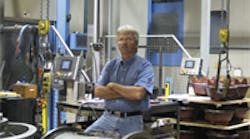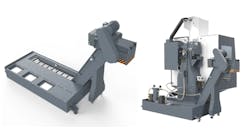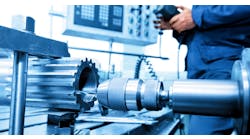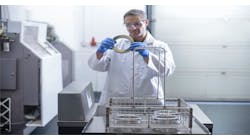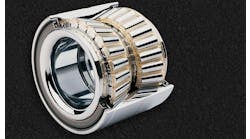The KVK Precision Specialties Inc. operations in Shenandoah, Virginia are impressive. The company is comprised of four facilities at the Shenandoah campus and another shop remote from this site for a total of 270,000 sq ft of manufacturing space. Within these shops are over 80 precision CNC machining centers, including EDM, a Toyoda FMS System with 48 800-mm pallets to serve four FA 800 machining centers, a complete Trumph FMS laser and punch cell, and an automated powder-coating line.
KVK has 72 employees who work four 10-hour shifts per week. Revenue in 2008 was $22 million. Although business is off somewhat due to the current economic downturn, the last three years have been the best ever for KVK.
The company’s growth is the result of President Jeff Vaughan’s background, training, approach to business and his sense of duty and responsibility. Vaughan grew up in the Shenandoah Valley. He was always interested in making things, so 10-year old Vaughan started hanging out after school at the facilities of a gentleman who ran a woodworking shop and a metalworking shop. However, to avoid the woodworking dust, he shifted his interest to metalworking, which he found to be much more to his liking. By the time he was 13, his fascination with machines led the budding machinist from sweeping floors to running a cut-off saw, then to a lathe and, finally, a vertical mill.
During his high-school years, Vaughan worked summers in the Shenandoah shop beside three German toolmakers. He became fascinated with the tool-making craft and during high school prepared himself for a career as a toolmaker. After earning an associate’s degree in mechanical engineering at night at a local community college, Vaughan left the Shenandoah machine shop and joined a much larger manufacturer that offered him an apprenticeship, leading to a toolmaker’s certification. There, he gained valuable experience with a variety of large, sophisticated production equipment.
By the time the impatient and energetic Vaughan was 20 he had worked at two fairly large manufacturing plants. However, he grew disillusioned with his slow financial progress, and the poor work ethic that prevailed there as a consequence of a promotion policy based on seniority rather than skill and ability. He decided he could do much better operating his own job shop. When he built a home for his wife and new child, the first floor would be a machine shop.
Vaughan risked everything he owned to borrow $25,000 to purchase a cut-off saw, a vertical mill and a lathe to start his machine shop. He knocked on doors in the Shenandoah Valley and generated work from several food-service operations in the area, and the companies where he had worked previously.
The shop prospered and soon Vaughan became overloaded with work. In 1977, after three years of operating the shop himself, he partnered with two toolmakers he had previously supervised to form KVK Precision Specialties Inc. Their association lasted a year-and-a-half before Vaughan bought out his partners.
He developed an ambitious fiveyear business plan and moved the operation to a building in Shenandoah he had converted to a machine shop. As KVK progressed it outgrew its facility, so Vaughan acquired the sevenacre parcel that is the company’s current location.
After 18 months KVK’s new 30,000-sq ft building was expanded with a 3,000-sq ft steel bay. Before long the growing company acquired a 12,000-sq ft building across the street from the original plant, which has been expanded three times to its present 43,000-sq ft size.
All of this capacity was dedicated to machining, but in 1996 Vaughan also had a need for fabrication capabilities to meet expanding customer needs.
| • KVK Precision Specialties Inc. Shenandoah, Va. www.kvkprecision.com • Number of employees — 72 • 2009 sales — $13.3 million (2008 sales — $22 million) • Markets served: Off-road mining and construction, HVAC, power generation |
Earlier this year, Vaughan acquired a 20,000-sq ft carbide grinding shop — Objective Industries — about an hour from Shenandoah. “The extremely precise work this facility does is mostly for the medical and aerospace industries,” Vaughan said. “The workforce at this shop is highly specialized, and my role is to energize the operation and grow the business. My daughter, who recently joined KVK, is being groomed to manage this shop.”
Initially KVK manufactured rather small components that did not entail particularly tight tolerances. But as the company grew, Vaughan focused on small runs of larger, higher precision parts. The usual job quantity at KVK is 25 parts. This means, of course, that the machine tools he needs for such work are very expensive. “We have never cut corners when it came to buying the best machine tools, tooling and gauging equipment,” he said.
Although most of the work at the company involves the manufacture of components and subassemblies, KVK produces a complete brake system for a major manufacturer that it ships directly to end users.
Vaughan recognizes that the core competency of many of his large customers is not manufacturing, but rather product design and marketing. With its wide range of capabilities, these customers look to KVK to provide the manufacturing focus that they lack.
According to Vaughan, one of the problems in dealing with large customers is the high turnover rate among purchasing personnel. The result is a lack of understanding about the skill and technology it takes to produce precision parts. His response is to encourage them to visit KVK, where they can learn about precision manufacturing first-hand. “I’m up-front with my customers and prospects and tell them my target is to realize a 15-percent profit on their job,” Vaughan said. “Some think this is too high, but those who have an appreciation of KVK’s capabilities are comfortable with this target. Communicating my profit goal helps to identify who I should be doing business with, and who I should forget about.”
Vaughan has partnered with many of his customers via three- to fiveyear contracts that guarantee quality, delivery and labor costs during that period. The only variable is material costs. This approach has been successful because as KVK gains experience with a job it becomes more efficient and effective, cycle times are reduced and throughput increases.
Vaughan says an important asset is the knowledge that cutting tool manufacturers possess and are anxious to share with companies like KVK. Over the years the company has been particularly close to Mori Seiki and its technology developments. KVK has partnered with J&H Machine Tools Inc., headquartered in Charlotte, North Carolina and the Southeast’s largest machine-tool distributor, to apply Mori Seiki technology to manufacturing opportunities at the company.
Vaughan has three business priorities: first, to ensure that his employees are up-to-date and trained in the latest manufacturing technology that is appropriate for the shop; second, to keep current in payments for machine tools; and third, to pay the utilities required for his operations.
“I am dedicated to providing my staff with better apprentice training than I had,” Vaughan said. “This is why I concentrate on training and exposure to the latest equipment and technologies.” Vaughan started attending the International Manufacturing Technology Show in 1976, and has attended every IMTS since then. He now takes 10 to 20 of his staff to each show to expose them to the broad range of technologies exhibited.
